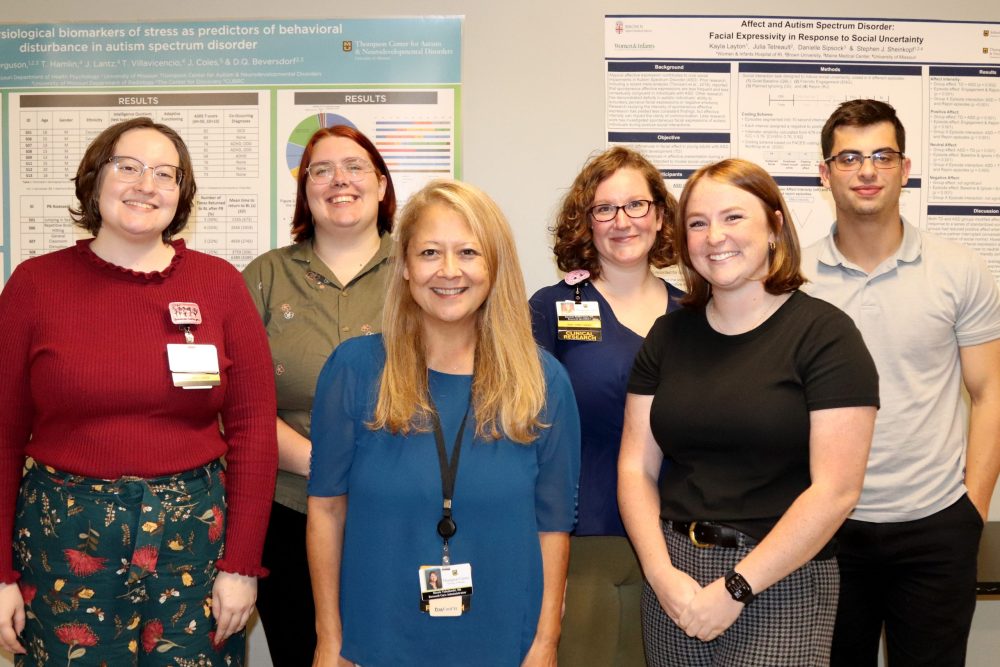Photo: Thompson Center Research Core Staff (Left to Right): Bailey Long, Jane Manson, Nicole Takahashi (Director), Amanda Moffitt Gunn, Katelyn Weber, Nick Kanne (not pictured: Dakota Fields)
This article is from the fall 2024 issue of DISCOVERY, the Thompson Center’s research newsletter.
To maximize efficiency and foster expertise, the Thompson Center has developed a unique research structure that supports our mission of supporting individuals and families impacted by autism and other neurodevelopmental diagnoses. Our centralized Research Core allows our dedicated faculty to work on a wide range of studies with professional support, ensuring that the complexities of autism are met with the utmost care. This structure, alongside our access to the Thompson Center clinic and partnerships with other clinics across the MU Health Care system, allows us to be a leader in large, multisite studies, which can offer invaluable benefits to our patients and their families.
Why Multisite Studies Matter
Large, multisite studies allow researchers to access a more diverse group of participants, making the results more reliable and applicable across a broader range of settings. A larger pool of participants means that we can analyze subgroups more effectively—whether by age, gender, or other factors—providing more personalized insights. For families, this means that the findings from these studies are more likely to reflect real-world experiences and can ultimately lead to better services and supports.
Let’s take a closer look at some of the impactful multisite studies happening at the Thompson Center.
EarliTec: Eye Tracking for Early Autism Diagnosis
One of the innovative projects currently underway at the Thompson Center is the EarliTec study, developed by EarliTec Diagnostics Inc. This study uses a tablet device called the EarliPoint Evaluation for Autism Spectrum Disorder. The device shows videos depicting social interactions and tracks what the child is attending to by measuring their eye movements. An algorithm analyzes the data, and calculates the likelihood of autism.
To validate the device, participants undergo cognitive or developmental testing conducted by trained staff. This comprehensive approach aims to create a valid, reliable, easy-to-use autism screening tool that can be applied across clinical settings.
Since joining the EarliTec study in 2023, the Thompson Center has recruited about 70% of the typically developing participants needed for the research. These participants also undergo developmental and IQ testing, and parents are notified if the results suggest the need for further evaluation.
Our team has also consulted on aspects like IQ test administration and case management, helping to guide best practices for other participating research sites.
SPARK: The Largest Genetic Study of Autism
Another large-scale project happening at the Thompson Center is SPARK, the world’s largest genetic study of autism. With more than 100,000 individuals with autism and 175,000 of their family members enrolled, SPARK aims to better understand the genetic causes of autism and to use this knowledge to inform therapies, treatments, and support systems.
SPARK’s broad participant base has allowed researchers to identify more than 100 genes linked to autism. Families identified to have specific genetic links to autism receive personalized reports, providing crucial insights for roughly 10% of the participants. Additionally, through SPARK Research Match, participants are connected with other relevant research opportunities.
The Thompson Center is in its ninth grant year for SPARK and was the top recruiter out of 17 clinical sites last year, contributing to the vast scale that allows researchers to identify patterns and subgroups in autism with more accuracy than smaller studies could.
The Early Years Study: Exploring the Earliest Signs of Autism
The Early Years Study, originally launched at Brown University, focuses on identifying early indicators of autism in infants. This study collects data from infants and their families, including recordings of infant cries, developmental milestones, temperament, and behaviors. The goal is to understand early markers of autism that could lead to earlier and more effective interventions.
As recruitment for the Early Years Study wraps up, researchers are preparing for the next phase of the project. Children whose screening results at age two indicate the possibility of autism will be invited to come to the Thompson Center for a comprehensive evaluation. The results of this testing will be given to families in order to support and find resources for their children. The results will also help the research team to identify a set of infant characteristics that predict the whether a child is likely to be diagnosed with autism.
Beyond its primary aims, the Early Years Study is also exploring several related research questions, such as the connection between parental autistic traits and the likelihood of autism in their children.
Many Sites, One Goal
The common goal of all research at the Thompson Center is to make discoveries that benefit neurodiverse individuals and families. Whether it’s developing an easy-to-use screening tool through the EarliTec study, unlocking genetic links through SPARK, or identifying early signs of autism in infants through the Early Years Study, we’re committed to driving research that will improve lives.


